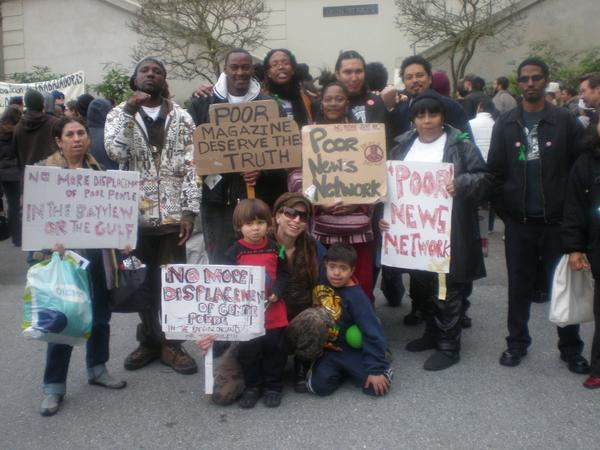Redemption, a new film by Amir Soltani is reviewed
by tiny aka Lisa Gray-Garcia, poverty scholar and daughter of Dee in collaboration with Gloria Esteva, Muteado, Sam Drew, Teresa Molina,
Phil Adams, Bruce Allison & Thornton Kimes
 |
|
by Staff Writer “Redemption? Who is being redeemed? And who is doing the redeeming?" Gloria’s plaintive question synthesized many of the feelings of anger Redemption, the movie, is focused on the recyclers (read: workers from |
By the late 90’s dot com era, the fix was in. Enter the
Loft-Monsters, a cadre of real estate developers, speculators and
architects who began to re-colonize the now cutesy, slightly whiter,
now arty, West Oakland. Suddenly corporate media was counting how many
young men of color were dying on its streets. It was odd how, with the
advent of the loft monsters, all of a sudden so many young black men
were dying--or was it that so many were being counted? Poor peoples
housing, both HUD and market rate housing, like me and my mamas, which
was still holding on by a thread in West Oakland, were being summarily
stolen from under us by gentrification sponsored evictions and/or
criminalized by agencies from the ATF, CPS to DPW, leaving most
of us in the new public housing, jail and/or still in the neighborhood
working in unrecognized labor like recycling, dwelling in our cars or
our new cardboard homes, only to be razed and harassed by cops and
“swept up” by hygienic metaphors such as “cleaning up” the
neighborhood.
This racist herstory and history of destruction, betrayal and genocide
in West Oakland neighborhood is not in the film. Rather, there are
visions of power and metaphors of loss. The movie opens with cans,
bottles and cardboard, flowing down the ramp of a recycling truck like
water from an urban river, it’s a beautiful opening metaphor for the
nature of trash. Out of this, a camera shot follows a worker, a
recycler, as he walks through his work day. He and other poverty
scholars speak in the film about their struggle to survive and do
their recycling (only referred to once in the film as “work”). These
interviews are co-mingled with a series of interviews with the owning
class (loft-dwellers) speaking about how the recyclers are a blight,
are fostering a drug culture and stealing their trash. There are a few
interviews with the business owner of the recycling place and some
local officials who talk about the “dignity” of being able to redeem
cans for cash.
As the lights went down and people praised Amir for his “powerful”
film, my anger and sorrow were choked in my throat. As a poverty
scholar who recycled to survive through homelessness for many years in
Oakland, who advocates for the workers rights of recyclers to be
considered as workers at all, instead of bums, dirty, crazy and all
the other myths told and re-told about poor folks locally and
globally, who has fought gentrification and its many roots in the
poverty and homelessness of gente pobre in West Oakland, I felt
betrayed.
At POOR we have a concept we have formalized called Poverty
Scholarship, to formerly understand, integrate and hold the knowledge
that we as folks who have struggled with poverty, homelessness,
eviction, substance use, violence, incarceration, criminalization and
border fascism have to ensure that artists and formerly educated
folks like Amir are co-authoring, and co-producing media with our
scholars on issues like this that come directly out of our lives and
scholarship. To forge collaborations in media and research with poverty scholars, to work horizontally rather than hierarchically- to share gifts of access and funding so that
these collaborations are possible, to make
sure the voices in struggle are in fact leading these dialogues, these
stories, these perspectives. Yes of course, the owning class should be
in there too! but in art there is something called metonymy: if you
see someone who looks like you in the art (film, performance, action)
you identify with their voice, their perspective, their ideas, their
actions, which is why it is so important to make sure that an informed
history and herstory of oppression, activism and resistance is
included in these art pieces as well!
So what to do? I know Amir meant to create a powerful film that would
help the poverty scholars and workers in West Oakland who he featured
in the film, folks who, like this poverty scholar, need to not be
criminalized for the sole act of working, but instead must be
supported and honored for our work, our scholarship.
The film has a chance, it just needs some real framing and
information. It must include an interview with Just Cause Oakland who
has been actively resisting gentrification and eviction in West
Oakland for years, Western Regional Advocacy Project (WRAP) who has
done extensive research about the destruction of HUD housing in
California and the criminalization of houseless folks, an on-screen
interview with anyone of POOR’s poverty scholars about our proposal to
support workers as independent contractors and our beliefs about
recycling as a form of micro-business, and a re-distribution of some
grant funds received for the film to support de-criminalization
efforts and housing of the houseless folks featured in the film.
I hope Amir listens to this scholar because after much debate and
discussion at POOR Magazine’s indigenous circle of news-makers in
community Newsroom we poverty scholars believe all of these steps will,
in fact, redeem Redemption.



